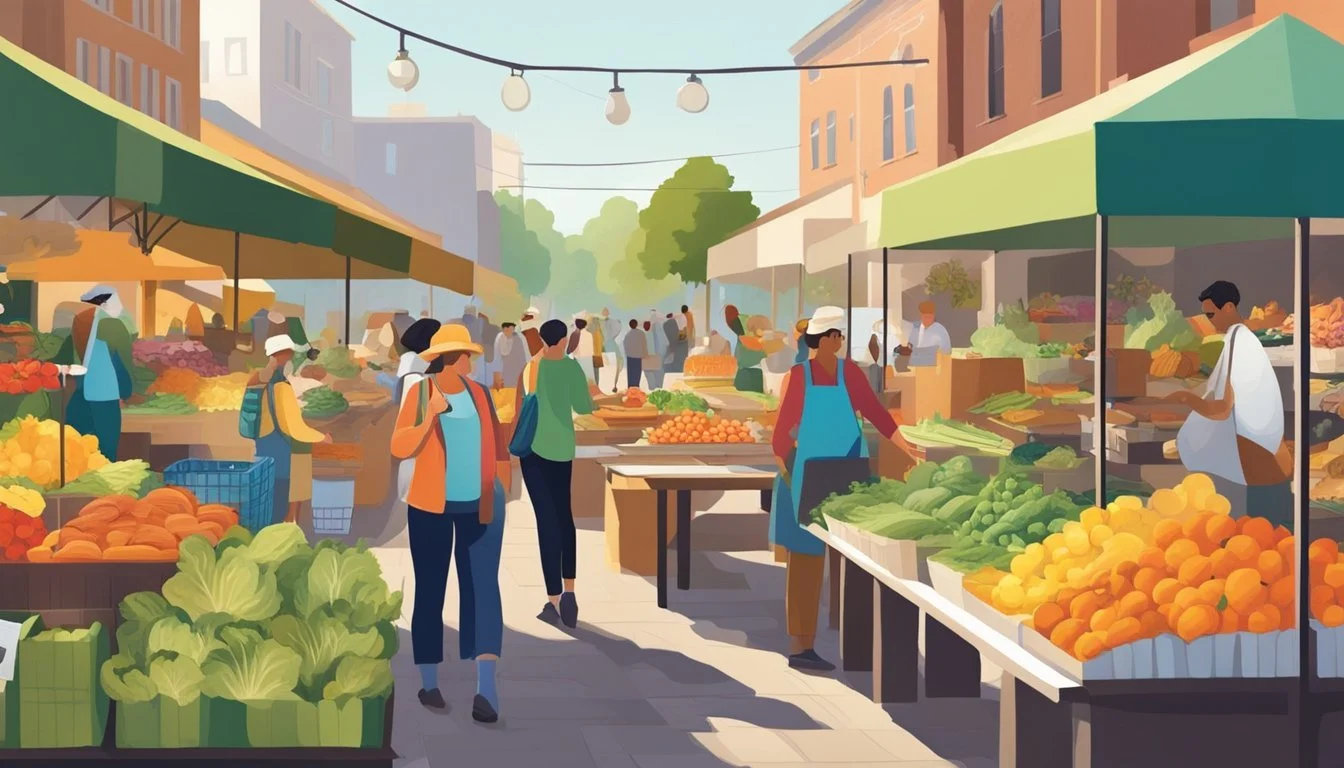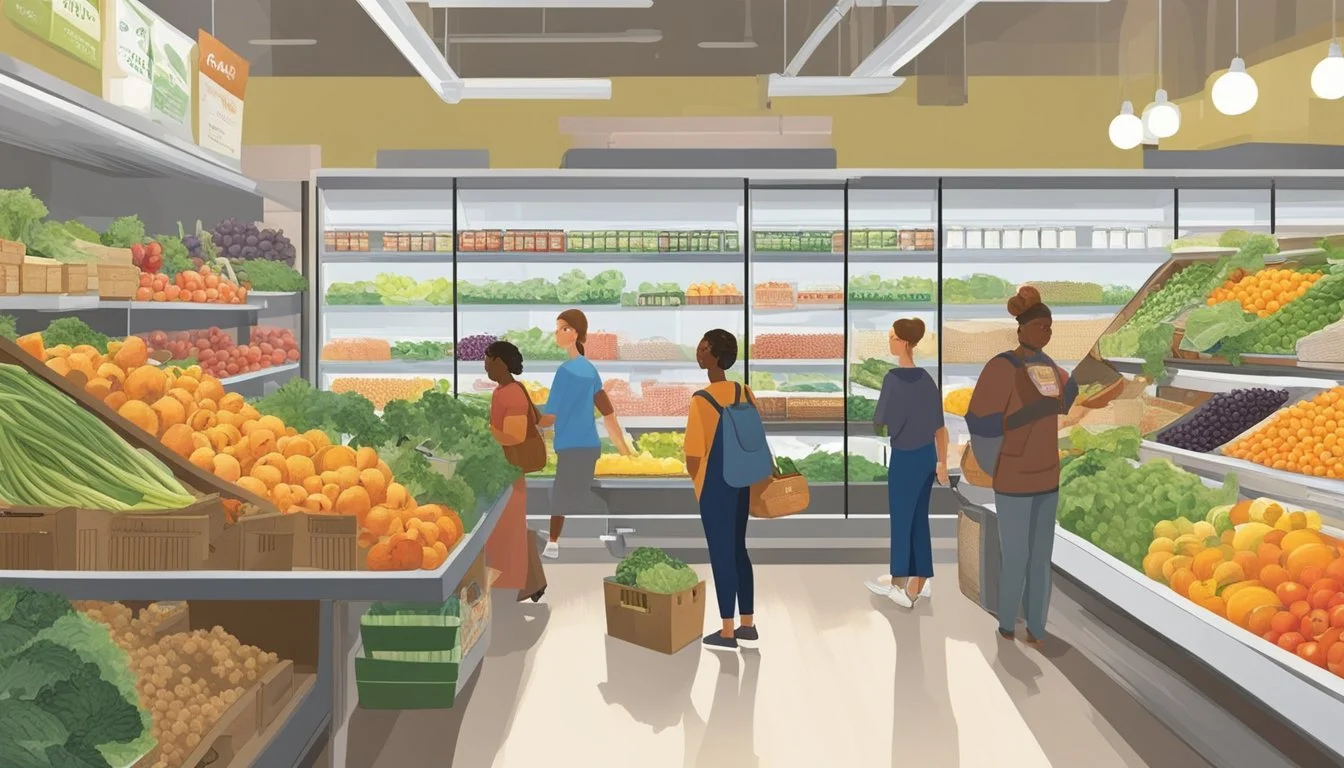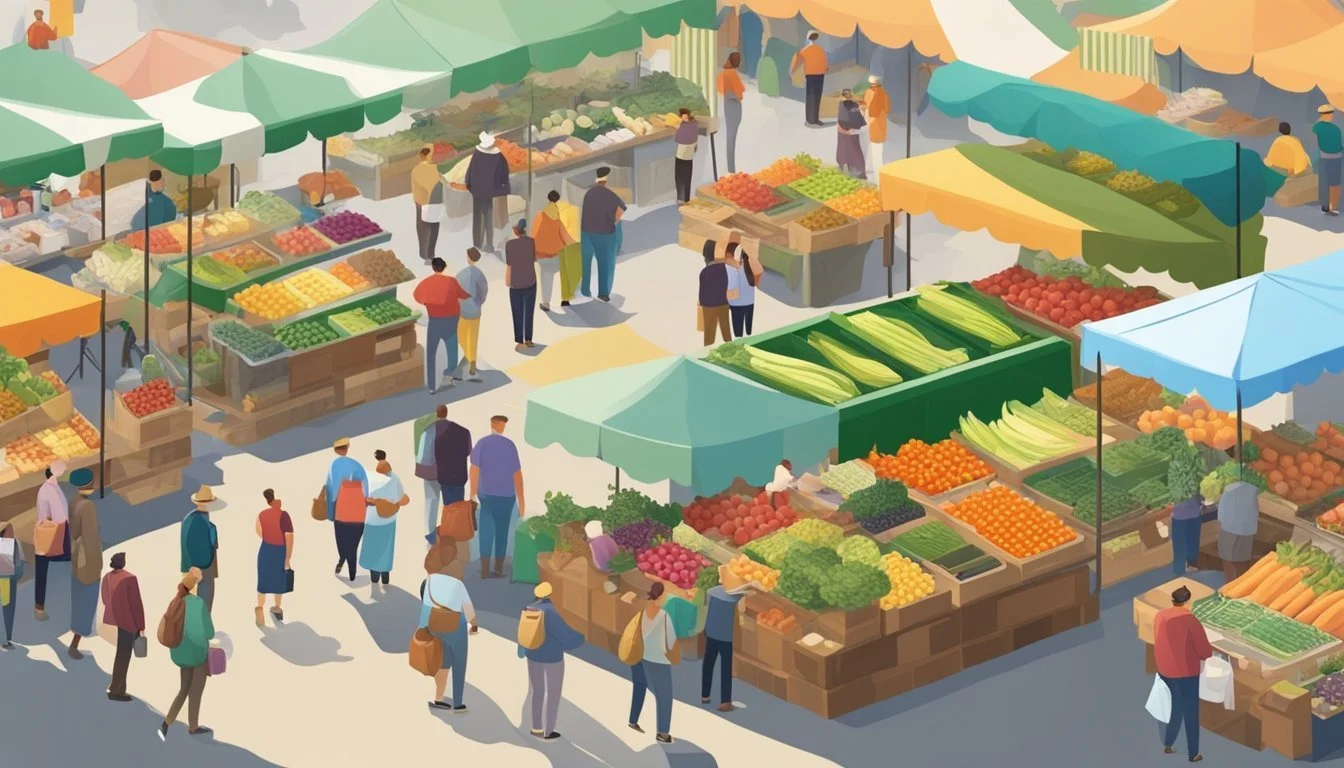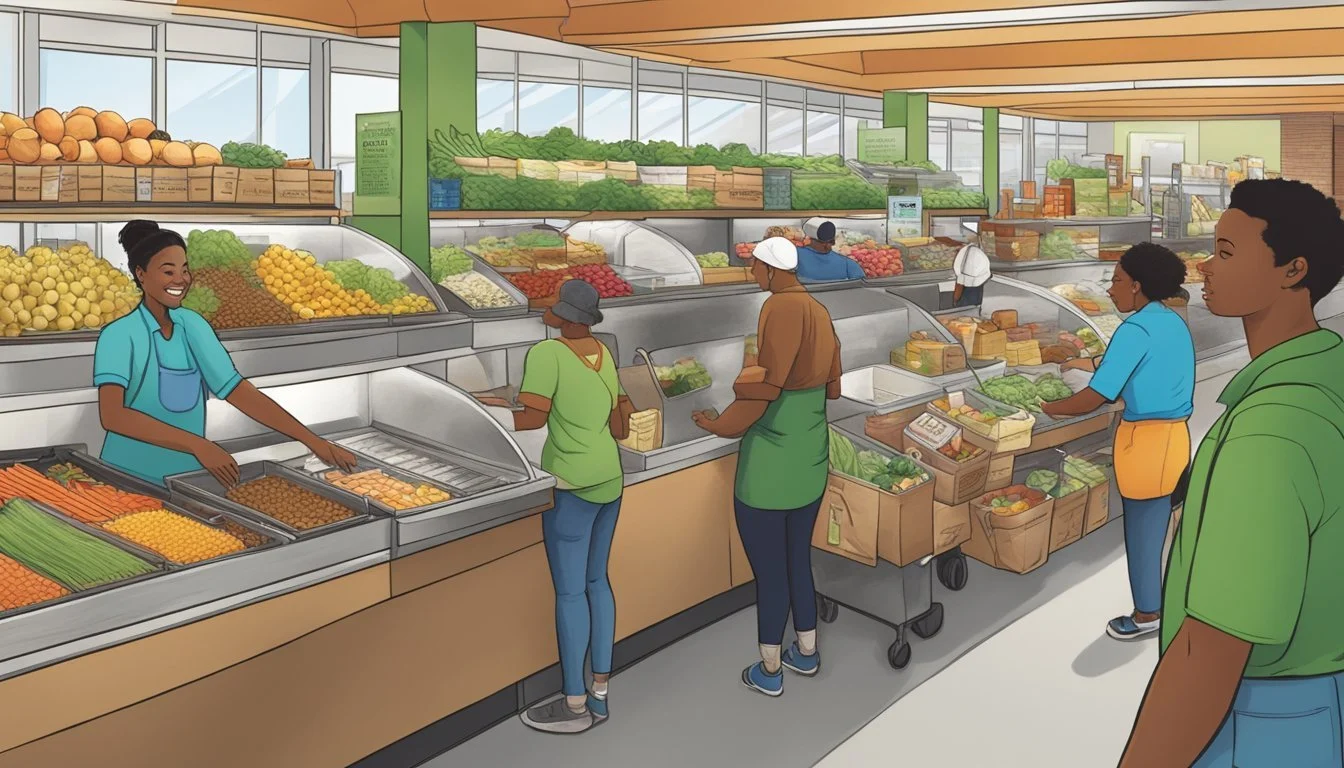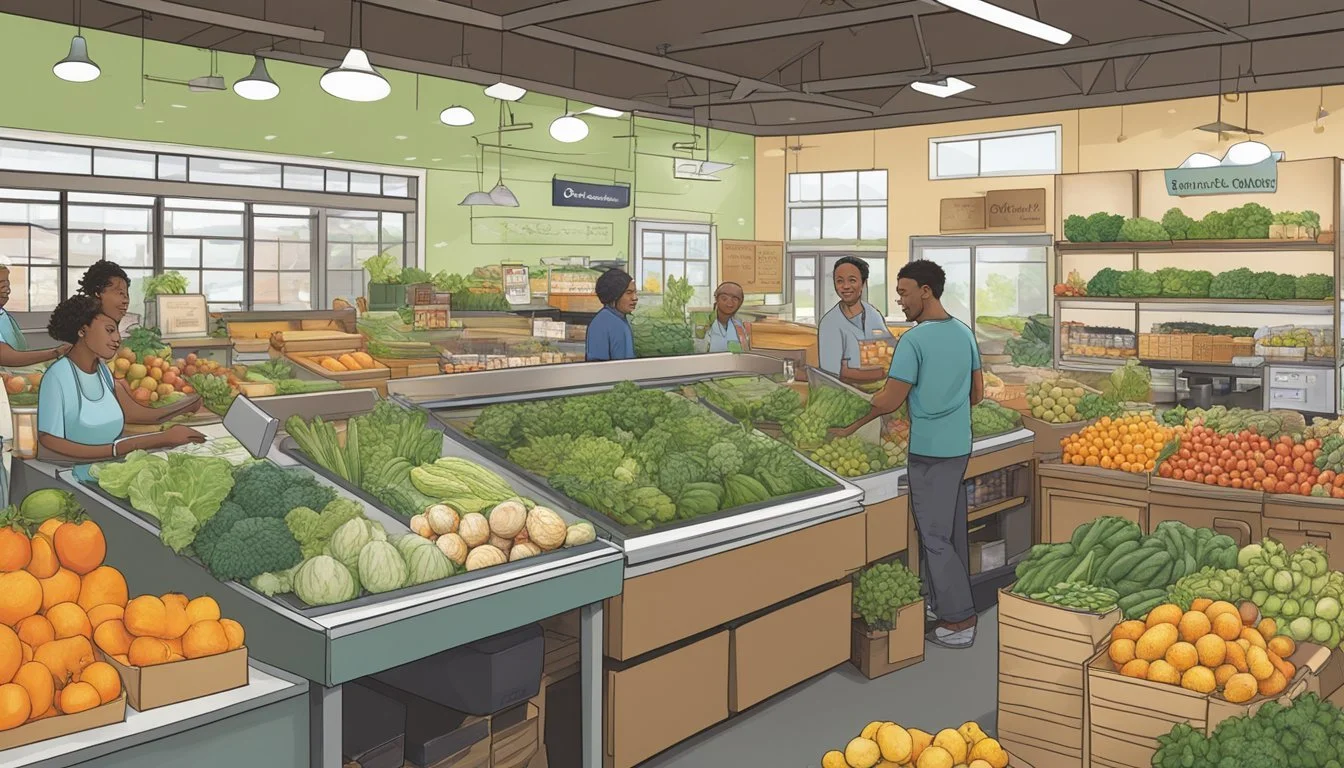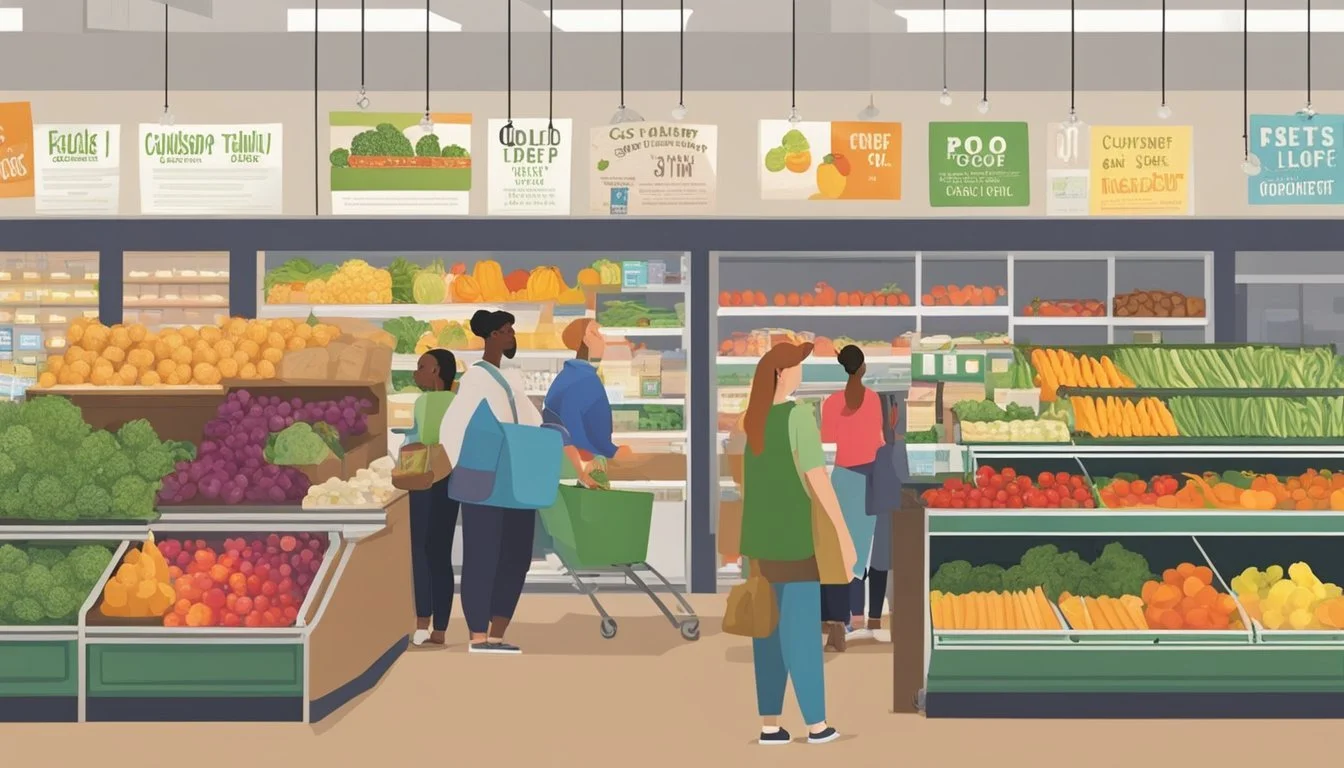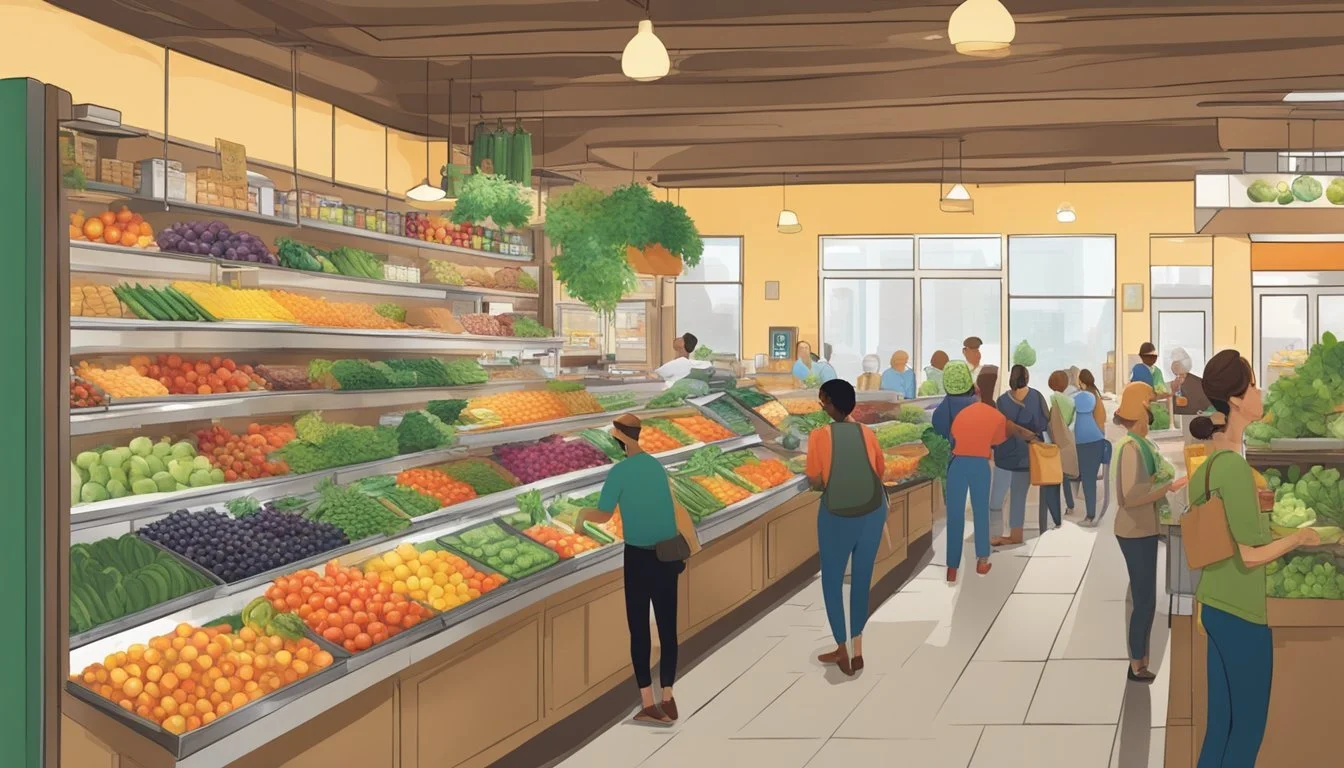Guide to Food Co-Ops in St. Louis, MO
Your Essential Shopping Directory
St. Louis, Missouri, serves as a welcoming hub for a variety of food cooperatives—community-centric entities that offer locally-grown produce and goods, championing the ethos of healthy living and supportive local economies. These co-ops not only provide residents with access to fresh, nutritious options often surpassing typical supermarket offerings but also reflect the city's commitment to sustainability and community engagement.
Food co-ops in St. Louis distinguish themselves through a combination of open-membership policies, community orientation, and partnerships with local farmers and artisans. By opting into memberships at these co-ops, individuals directly support the local food system, benefit from the absence of unnecessary preservatives, and often discover that their groceries boast a superior quality. Moreover, these food co-ops act as social enterprises that reinvest profits back into local initiatives, fostering a sense of communal responsibility and shared success.
With a diverse range of offerings, from the family-run Fair Shares that meticulously curates shares of local food, to the MARSH Grocery's focus on organic, farm-fresh products, St. Louis food co-ops cater to various preferences and needs. Each co-op maintains its unique model of operation, whether it's a traditional store format like Copia North Sarah, or a CSA (Community Supported Agriculture) model that enables direct farmer-to-consumer selling. This variety ensures that residents can find a food co-op that aligns with their values and lifestyle choices.
History of Food Co-Ops in St. Louis
St. Louis's relationship with food cooperatives traces back to a community effort to address food security and sovereignty. Food co-ops in this city are not just stores but are emblematic of a grassroots movement for better food access and community ownership.
In the early stages, St. Louis food co-ops emerged from a desire to purchase wholesome, affordable food collectively. These initial co-ops were often informal, paving the way for more structured cooperatives. They empowered members to buy in bulk, thereby reducing costs and fostering a sense of camaraderie.
With time, the concept of food co-ops in the city evolved. They started putting significant emphasis on providing organic and natural food options. This came as a response to the community's growing awareness and concern for health and environmental issues. Food co-ops became a preferred destination for those seeking alternative shopping experiences that aligned with their values.
MARSH Grocery Cooperative stands as a notable example in St. Louis's cooperative scene. Located in the Carondelet neighborhood, this community-owned grocery store is a relatively recent addition, celebrating the collaboration and unity within the area. It represents a modern iteration of the co-op ethos: providing fresh, quality food while tackling food insecurity head-on, making it a pivotal point in the city's food co-op timeline.
These cooperatives have thrived on the principles of democratic member control, economic participation, and community focus – key elements that have historically been part of cooperative movements worldwide. Within St. Louis, food co-ops continue to be an essential part of the community, representing a blend of the city's innovative spirit and commitment to collective welfare.
Types of Food Co-Ops
In St. Louis, Missouri, food co-ops offer a variety of ownership models catering to different community needs and values. Each model plays a significant role in how the co-op operates and serves its members.
Consumer-Owned
Consumer-owned co-ops are enterprises where the consumers themselves own and govern the grocery store. Members pay an upfront fee to join the co-op, which grants them voting rights on important issues and often entitles them to special discounts or dividend returns. Profits are typically reinvested into the co-op or returned to the members based on patronage. These co-ops prioritize product quality and community education and strive to support local producers.
Worker-Owned
Worker-owned co-ops are controlled by the employees, ensuring that the people who work in the co-op have a stake in the business. In this non-profit model, each worker has an equal say in the decisions of the grocery co-op and profits are shared amongst the worker-owners. This leads to a focus on fair labor practices and can contribute to a more motivated and dedicated staff.
Hybrid Models
Hybrid models of food co-ops blend elements of both consumer and worker ownership. These co-ops allow grocery co-op members who are both consumers and workers to share in ownership. The hybrid approach aims to leverage the benefits of both models, fostering a strong sense of community involvement and worker satisfaction, with profits benefiting a wider range of stakeholders.
Benefits of Shopping at Food Co-Ops
Food co-ops offer a distinctive shopping experience that provides numerous benefits to their customers and the community as a whole. They emphasize fresh produce and healthy food options, often supplying a range of local and organic products. By prioritizing food that has reduced packaging, they contribute to a more sustainable shopping model, generating less waste in the process.
Here are key benefits shoppers can enjoy at food co-ops:
Local Products: Food co-ops often stock products from local farmers and producers, fostering a closer connection between consumers and the source of their food.
Member Involvement: Customers have the opportunity to become member-owners, allowing them to have a say in the products stocked and the co-op's operational decisions.
Environmental Impact: By sourcing locally and choosing environmentally conscious options, co-ops help shoppers make a positive impact on the environment.
Community Engagement: Co-ops aren't just grocery stores; they serve as community hubs that can lead to further communal activities and engagement.
In St. Louis, MO, food cooperatives also adapt innovative approaches like offering a "pay what you can" model, making healthy food more accessible to a wider range of people and supporting the co-op's values of inclusivity and mutual support. With these factors, food co-ops in St. Louis stand out as a valuable resource for residents seeking quality food options and a way to support their local economy and environment.
Membership and Ownership
In St. Louis, MO, food co-ops offer unique benefits and structures compared to traditional grocery stores. They emphasize community engagement and provide members with both financial and participatory roles.
Membership Benefits
Members of St. Louis food co-ops often enjoy various benefits. They can participate in a sliding scale payment system, allowing consumers to pay what they can, thus promoting economic inclusivity. Benefits also typically include:
Access to high-quality, locally sourced produce and goods.
A voice in co-op governance and decision-making processes.
Special discounts and member-only sales.
By joining a co-op, members actively support non-profit models and community-centric food systems. They contribute not only to the local economy but also to sustainable and organic practices, directly influencing the co-op’s offerings.
Ownership Structure
The structure of ownership within food co-ops is democratic. Here's how it typically works:
Every member is an owner, with equal share and voice.
Ownership entails responsibility for shaping the co-op’s direction.
Members elect a board of directors from within their ranks to oversee major decisions and the co-op’s long-term strategy.
Ownership in a co-op is about investing in one's community and having the opportunity to influence the offerings and operations of the establishment. It's not just a financial stake but a commitment to the co-op's values and mission.
Local Food Co-Ops Directory
St. Louis, renowned for its vibrant food scene, boasts an array of Food Co-Ops committed to providing local, high-quality groceries. These co-ops offer a more personalized and community-oriented shopping experience, enhancing consumer choice with locally sourced products.
Marsh Grocery Cooperative
Location: St. Louis, MO
Highlights: Marsh Grocery Cooperative stands out as a vital resource for St. Louis residents, offering diverse local food options. Its commitment to locally grown produce ensures fresh, seasonal selections for its members.
Carondelet Neighborhood Co-Op
Location: Carondelet Neighborhood, St. Louis, MO
Highlights: This cooperative is a cornerstone of the Carondelet neighborhood, promoting local food sourcing and empowering the community by providing wholesome foods and artisanal products from the surrounding region.
Azure Standard
Location: Delivery available in St. Louis, MO
Highlights: Azure Standard offers a unique approach, focusing on delivery and drop-off points around St. Louis. They supply a range of organic and non-GMO products, emphasizing bulk purchases for households keen on quality and conscientious consumption.
Local Harvest
Location: St. Louis, MO
Highlights: With a reputation for supporting local farmers and artisans, Local Harvest is a trusted option for consumers seeking organic and specialty foods. Their product range responds to the needs of health-conscious and eco-aware shoppers.
Contribution to Local Economy
Food cooperatives in St. Louis, such as the MARSH Grocery Cooperative, play a crucial role in bolstering the local economy. They are more than just a place to purchase food; they are multifaceted establishments fostering community resilience and economic growth. At their core, food co-ops provide employment opportunities, creating jobs for residents within their neighborhoods. These are not just any jobs, but positions that often offer fair wages and a sense of ownership, as cooperatives typically operate with a worker or member-owner model.
Local food sourcing is another economic pillar for food co-ops. By prioritizing products from local farmers and producers, co-ops keep the economic benefits within the community. This support helps to ensure the viability of local food systems and contributes to a more robust local economy. Purchasing from local suppliers also reduces transportation costs and environmental impact, making it a sustainable choice that resonates with environmentally conscious consumers.
Economic Impact:
Jobs creation within the community
Support for local farmers and producers
Food co-ops often serve as community gathering spaces, which can have a catalytic effect on neighborhood development. They can act as anchors for community activities, meeting spaces, and educational workshops, all of which contribute to the strength and cohesion of the neighborhood. Additionally, by offering sliding scale payment options, co-ops like MARSH ensure access to high-quality food for everyone, regardless of means, addressing food insecurity while circulating dollars within the local economy.
Community Benefits:
Meeting spaces for education and engagement
Addressing food insecurity with equitable pricing
These organizations exemplify how a focus on local food systems can weave together economic benefits, job creation, and community wellbeing, underscoring their importance in the fabric of St. Louis's local economy.
Educational Programs and Community Outreach
Food co-ops in St. Louis, Missouri, go beyond providing groceries; they play a pivotal role in community development and education. These cooperatives frequently invest in educational programming and outreach activities, becoming integral parts of the neighborhoods they serve.
At the heart of this involvement lies a commitment to food education. The co-ops offer workshops and classes aimed at improving nutritional knowledge and food preparation skills. This helps individuals make informed decisions about their diets and supports the larger goal of promoting health and wellness within the community.
Outreach efforts are tailored to extend the cooperative's reach, often targeting those in need. By sponsoring non-profit initiatives, including food banks and clinics, the co-ops demonstrate their dedication to St. Louis's overall well-being.
Co-op Feature Community Impact Educational Programs Increased nutritional awareness and skills Community Outreach Support for non-profit organizations
Additionally, co-ops in St. Louis prioritize sustainability and local sourcing. By intertwining their operations with local suppliers and organic producers, they enhance the community's resilience and ensure a steady supply of wholesome, local groceries.
The aforementioned co-ops often partner with organizations such as Operation Food Search to address hunger. These partnerships reflect a comprehensive approach, combining emergency food distribution with long-term food security initiatives. Together, they not only tackle immediate needs but also strive to empower the community through education and sustainable practices.
Environmental Engagement and Sustainability
Food cooperatives in St. Louis demonstrate a robust commitment to environmental sustainability and engage in practices that support local ecosystems. Known & Grown STL, a program by the Missouri Coalition for the Environment, exemplifies this by certifying local farmers. Their criteria ensure that only those practices that prioritize environmental stewardship receive their seal of approval.
These cooperatives typically stock organically produced goods, supporting a farming method that is not only sustainable but also conducive to soil health and biodiversity. By sourcing locally grown produce, St. Louis co-ops reduce carbon emissions that are associated with long-distance transportation of food items.
Furthermore, the Green Dining Alliance in the region actively works with restaurants, some potentially supplied by co-ops, to lower their environmental impact, encouraging sustainable practices across the food service industry.
Entity Role in Sustainability Sustainable farming Preserves local ecosystems Organic produce Promotes healthier soils Local farmers Reduces carbon footprint Environmentally-focused organizations Advocates and certifies sustainable practices
Through these efforts, food co-ops in St. Louis form an integral part of a larger movement towards a more sustainable and environmentally friendly food system, serving as a bridge between consumers who desire eco-conscious products and the producers who cultivate them.
Shopping Experience at Food Co-Ops
Shopping at a food co-op is a distinctive experience where customers often find a unique mix of goods ranging from local produce to specialized organic foods. In Saint Louis, MO, food co-ops serve as community-oriented alternatives to conventional grocery stores, focusing on sustainability and local sourcing.
Variety of Goods:
Fresh, locally sourced fruits and vegetables
Bulk grains, nuts, and spices
Unique artisanal products
Unlike traditional markets, food co-ops in Saint Louis might offer handpicked housewares, garden supplies, and an assortment of curios beside their grocery selection. Prepared foods, echoing the spirit of unhurried craftsmanship, provide shoppers with healthy options that support local growers and producers.
Member Benefits:
Discounted prices on groceries
Special deals for members
Opportunity to partake in decision-making
Engagement with a community-focused enterprise
Customers are often members who have a say in the operations, fostering a sense of ownership. The shopping environment is friendly and supportive, with staff typically knowledgeable about products and their sources.
Store Layout:
Open and welcoming space
Clearly marked sections for easy navigation
Information about the origins of the products
Saint Louis food co-ops pride themselves on providing a transparent and ethical shopping experience, with clear labelling and information about food provenance.
Comparison With Supermarkets
Food cooperatives in St. Louis offer a distinct alternative to traditional supermarkets. Each type of store presents unique characteristics in terms of product selection, pricing, and community involvement, which can influence a consumer's shopping experience.
Product Selection
Food co-ops often prioritize locally sourced and organic products, contrasting the wider, more international range commonly found in supermarkets. Supermarkets may offer an extensive variety of goods, including non-food items, whereas food co-ops focus on a curated selection of healthy food options that are typically produced within the community. This means that while supermarkets provide breadth, food co-ops offer depth in the form of fresh, locally grown groceries.
Pricing
In terms of pricing, supermarkets often benefit from bulk purchasing and economies of scale, potentially offering lower prices on some items. However, food co-ops in St. Louis tend to focus on providing affordable options while also supporting fair wages for local producers. Although some items at a food co-op might be priced higher due to their artisanal or organic nature, shoppers at co-ops can find competitive prices on seasonal produce directly sourced from local farmers.
Community Involvement
Community involvement is a cornerstone of the food co-op model. Unlike supermarkets, which are typically large corporations, co-ops are usually grassroots entities that are deeply embedded in their localities. They may operate on membership models, where shoppers can become part-owners and have a say in the grocery store's operations. Food co-ops often reinvest profits back into the community and engage in local events and initiatives to promote food literacy and access to healthy food options. Supermarkets may participate in community activities through sponsorships or donations, but they generally lack the member-driven focus of co-ops.
Supporting Local Agriculture
In St. Louis, MO, the community plays a critical role in supporting local agriculture. Various co-ops and food initiatives place emphasis on sourcing from local farms, ultimately providing residents with access to fresh produce. By connecting with these establishments, consumers contribute to the resilience of the regional foodshed.
One notable entity is the MARSH Cooperative, a non-profit sliding scale grocery store. It not only sells high-quality foods but also supports neighborhood farm lots, operates a commercial kitchen, and provides a community space. This integrative approach ensures that quality food is accessible to all demographics.
The Known & Grown STL project focuses on strengthening connections between consumers and local, sustainable farmers. It seeks to highlight the origins of food and prioritizes the health of both people and the environment within the St. Louis food system.
Community Supported Agriculture (CSA) programs are pivotal to this cooperative spirit. CSAs like Fair Shares bridge the gap between producers and consumers, supplying weekly shares of locally sourced food directly from small farms. This model encourages the consumption of seasonal produce and bolsters the local agriculture economy.
To support these initiatives during challenging times, like the pandemic, networks such as Slow Food St. Louis suggest various ways to maintain involvement with local farmers, emphasizing the importance of continuing the tradition of community-backed agriculture.
Residents are encouraged to explore St. Louis's diverse offerings, from the Old North Provisions that represent localized grocery alternatives, to educational platforms that foster awareness and participation in a sustainable food culture. Supporting these entities not only bolsters the local economy but also ensures a healthier, more sustainable future for St. Louis's food systems.
Co-Op Specialties
Food co-ops in St. Louis offer a unique shopping experience with an emphasis on quality and community. They specialize in a variety of items designed to meet the needs of their members.
Bulk Items
Co-ops often provide bulk items which allow shoppers to purchase the exact amount they need, reducing waste and saving money. Shoppers can find a diverse selection ranging from grains and pastas to nuts, seeds, and an assortment of spices.
Prepared Foods
For those who value convenience without sacrificing health, co-ops offer a range of prepared foods. These ready-to-eat options can include salads, sandwiches, and heat-and-eat meals, often prepared with local ingredients.
Baked Goods
Co-ops feature baked goods made in-house or sourced from local bakeries. Customers can indulge in freshly baked breads, cookies, pies, and other pastries, with many co-ops offering organic or gluten-free options.
Natural Foods
These markets are a haven for natural foods, priding themselves on a selection that includes organic produce, non-GMO products, and items catering to special dietary needs. Co-ops support local growers and suppliers, ensuring that their natural foods are of the highest quality and freshness.
How to Get Involved
In St. Louis, individuals looking to engage with their community can consider joining a food cooperative (co-op). Joining a co-op offers a chance to become a part of a community-focused network that values sustainable, local food. Here's how one can get involved:
Becoming a Member
Sign Up: Anyone interested in becoming a member can usually sign up online or in person at the co-op.
Share Purchase: Some co-ops require the purchase of a share to become a member-owner, granting voting rights and a say in the items stocked.
Volunteer Opportunities
Time Contribution: Co-ops often rely on volunteers for various roles and welcome time contributions from members and non-members alike.
Skill Sharing: Those with specific skills can offer their expertise in areas such as community outreach or store management.
Community Engagement
Meetings: Attend community meetings to stay informed and involved in co-op developments and decisions.
Events: Participate in events like food drives, workshops, and educational programs to foster a tighter-knit community.
Membership Perks
Discounts: Members may receive discounts on purchases and special orders.
Newsletter: Stay updated with a co-op newsletter, which can sometimes be edited or contributed to by members.
By taking these steps, individuals can contribute to their community’s well-being while also benefiting from the collective resources of a co-op in St. Louis.
Challenges Facing Food Co-Ops
Food co-ops in St. Louis, like those across the nation, encounter several obstacles that can impact their success and sustainability. These cooperative entities strive to balance the fulfillment of their missions with economic viability in a competitive market.
Market Competition: Food co-ops often compete with larger grocery chains that benefit from economies of scale. This presents a challenge in pricing, as co-ops must find ways to offer comparable goods without compromising their commitment to local and often organic produce.
Economic Constraints: Local food co-ops operate within the same economic constraints as any business, making financial sustainability a continual challenge. They must navigate tight budgets while maintaining the support of their members and the broader community.
Sourcing Issues: Consistently sourcing high-quality, local products can be difficult, particularly given Missouri's seasonality. Co-ops must build and maintain relationships with local producers, which sometimes leads to higher costs for consumers.
Member Recruitment and Retention:
Member Recruitment: Attracting new members is crucial for co-ops to thrive. They need to communicate their unique value propositions effectively.
Member Retention: Keeping members engaged is equally important for maintaining a strong base and ensuring steady revenue.
Local News Impact: Public perception and awareness, shaped by local media coverage, can either support or hinder the growth of food co-ops. Positive exposure in local news can drive community interest and membership, whereas negative press can pose reputational challenges.
To overcome these hurdles, St. Louis food co-ops must remain adaptable and innovative, focusing on their strengths such as community orientation and support for local economies.
Future of Food Co-Ops in St. Louis
St. Louis, a city already on the path of embracing sustainable and community-focused shopping, anticipates a promising future for grocery co-ops. These co-ops prioritize local produce, bake goods on-site, and provide a variety of dry and refrigerated items, shaping a more inclusive and locally-supported food scene.
Community Impact
Food co-ops are not just stores; they're community epicenters. They foster local entrepreneurship, with members contributing to the cooperative's diverse offerings. The MARSH Grocery Cooperative has set a precedent in addressing both food justice and social justice, hinting at the focus of future co-ops in the region.
New Developments
Old Orchard Food Co-op
Status: Preliminary Stages
Focus: Local sourcing
Food City Initiative
Goal: Inclusive food ecosystem
Support: Food-industry workers, farmers, policy organizers
Educational Resources
Prospective founders of grocery co-ops can rely on sources like FCI's Guide to Starting a Food Co-op for a nuanced understanding of co-op development, covering key areas like incorporation and business planning.
The cooperative sector in St. Louis is backed by a community that values equitable access to fresh, quality food. This shared ethos promises robust growth for grocery co-ops in the United States and specifically in this Missouri city. Through initiatives such as Food City and new co-op establishments, the blueprint for a more connected and self-sufficient local food economy in St. Louis becomes increasingly clear.

